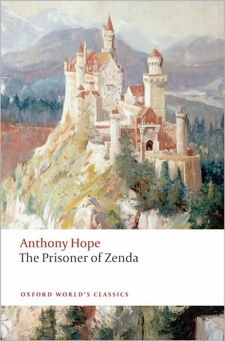The Prisoner of Zenda (1894) is an immensely readable and remarkably enjoyable book. It’s arch and funny and exciting in a swashbuckling way that makes it one of the wellsprings of twentieth century fantasy, even though it is not in itself fantastical. I hadn’t read it since I was about ten, but I thoroughly enjoyed reading it now and laughed aloud several times. If you haven’t read it and don’t mind reading on screen, I suggest downloading the free Gutenberg version (linked above) now and reading it in your coffee breaks for the rest of the day.
It’s not technically fantasy. Ruritania isn’t marked on our maps of Europe, but it isn’t full of giants and dragons, either. We’re supposed to take it as a country we’ve overlooked, a German principality somewhere on the edges, ruled by Elphbergs who are closer to Hapsburgs than to Elves, but nevertheless the kind of place where adventures happen.
Rudolf Rassendyll is an idle but honourable Englishman who happens to be descended on the wrong side of the blanket from the Ruritanian royal family, and to sport the distinctive nose and hair of the house of Elphberg. Going to Ruritania on holiday, he meets the new king out hunting on the day before the coronation, and takes the king’s place to avoid scandal after the king is drugged and subsequently kidnapped. This leads to complications, especially when Princess Flavia, destined to marry the king, starts to fall in love with his double.
This is the ur-double identity novel, or anyway the first one I know of. The similarity between Rudolf and the king is passed off as a family resemblance because of a genuine relationship. The hair and the nose are the same, they are the same height, they’re not absolutely identical. The idea is that they’re close enough to pass as a double to somebody who doesn’t know the king well—and that’s enough. It’s surprisingly plausible.
There’s no family to fool. This is much more like Double Star than it is like the other double identity books I’ve just been reading. It’s royalty, and it matters at a kingdom level (like a lot of fantasy) it’s not domestic, and there’s no revelation. The ending is quite different, but it’s otherwise much more similar than I had remembered.
The Prisoner of Zenda is full of villains, last minute escapes, duels, chases, sword-fights, ambushes, and a moving encounter around a tea table. I don’t want to spoil it. One of the really charming things about it is how ridiculously honourable Rudolf is—he’s desperate to rescue the king before the wedding, even though he loves Flavia and she loves him. Rupert, one of the villains, suggests at one point that they kill the people on both sides who know Rudolf isn’t the king, leaving him in control of the country. Rudolf never entertains this for an instant. He’s more honourable and romantic than anybody could be—and he’s all the better for it. This is not a book where psychological realism is an issue. This is a romp; princesses are beautiful, heroes are honourable, villains twirl their moustaches and live in awesome double castles with dungeons and drawbridges. It’s fast and fun and first person—and a charming first person Rudolf is.
There’s a sequel, also a double identity book, also available for free download, Rupert of Hentzau. This was written four years later after the first book was a bestseller. It suffers from several defects which the first book doesn’t. It’s much slower. It has a Ruritanian narrator who’s painfully Germanic and earnest—which is fine in a sidekick, but not so good in a first person narrator. It’s much darker, and not in a good way. And while I was sympathetic with the ridiculous levels of being honourable in The Prisoner of Zenda, I wasn’t here—perhaps a Victorian reader would have been happier with this, but I wasn’t.
Also, I could have sworn I’d read a different sequel when I was a kid, with different events. I must have dreamed it. Oh well. In my dream version, the king goes off on four weeks holiday every year and leaves Rudolf to impersonate him (and have passionate but chaste conversations with Flavia), then one year he doesn’t come back and they have to find out what’s happened without admitting he isn’t there. If I didn’t dream it, does anybody know what book this is?
Jo Walton is a science fiction and fantasy writer. She’s published eight novels, most recently Half a Crown and Lifelode, and two poetry collections. She reads a lot, and blogs about it here regularly. She comes from Wales but lives in Montreal where the food and books are more varied.










